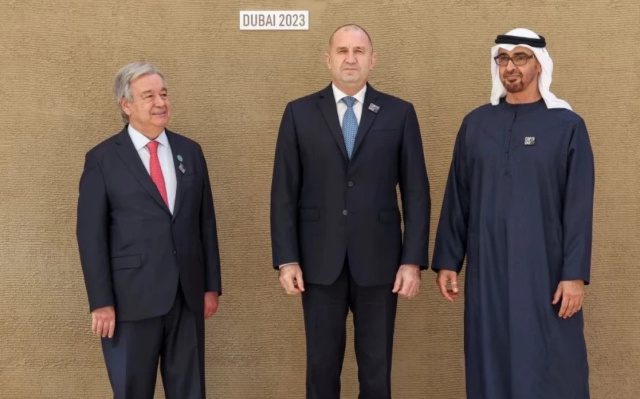
Dubai, December 2, 2023 – In a historic turn of events at the 2023 United Nations Climate Change Conference (COP 28), leaders from over 20 nations, including Bulgaria, have united in a landmark declaration to boost the global share of nuclear energy by 2050 significantly.
The momentous accord has garnered support from diverse corners, with Presidents Radev, Macron, Duda, Iohannis, and influential figures like Ulf Kristersson and John Kerry endorsing the transformative potential of nuclear power.
Bulgaria’s President Radev, a vocal advocate for the initiative, stressed nuclear energy’s pivotal role in securing national independence, fortifying security, and fostering economic growth.
With Bulgaria’s impressive half-century track record in safe and efficient nuclear operations, Radev positioned nuclear energy as a reliable cornerstone in the world’s energy mix.
Addressing the challenges associated with renewable energy transition, Radev underscored the limitations posed by weather dependency, the current state of affordable energy storage technology, and financial constraints.
He argued convincingly for nuclear power as a more viable alternative, capable of providing a consistent and dependable energy source.
In his inaugural address at the conference, John Kerry delivered a stark reality check. He emphasized that achieving zero greenhouse gas emissions by 2050 requires a pragmatic approach, integrating either nuclear power or carbon capture and storage technologies.
Kerry’s stance was firmly grounded in empirical scientific findings, urging global leaders to confront the pressing need for decisive action.
The declaration, which has garnered support from heavyweight nations including the United States, France, Sweden, the United Arab Emirates, Romania, Finland, the United Kingdom, Hungary, Canada, and the Netherlands, signifies a collective commitment to reshaping global energy policies towards a nuclear-centric future.
This unified global stance positions nuclear energy as a linchpin in the fight against climate change, offering a beacon of hope for a sustainable energy landscape.
As the world strives for a carbon-neutral future, the declaration at COP 28 paves the way for a seismic shift in energy policies, signalling a commitment to a cleaner, more secure, and economically robust future powered by nuclear energy.
This article was created using automation technology and was thoroughly edited and fact-checked by one of our editorial staff members
